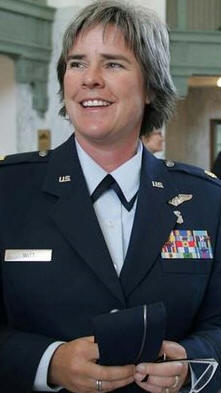|
|||||||||||
|
|
|
|||
|
By |
||||
 |
September 26, 2010
- A
After six days of
trial, Judge Robert Leighton found that Major Witt's sexual orientation
does not negatively impact unit morale or cohesion. ACLU of Washington
attorneys have represented Major Witt since her case began in 2006.
"Today we heard
the hammer of justice strike for Major Margaret Witt," said Kathleen
Taylor, Executive Director of the ACLU of Washington. "We look forward
to the day when all members of our military can serve our country
without invidious discrimination. To discharge Major Witt simply because
of her sexual orientation was entirely unfair to her and unwise for the
military, which needs her significant skills." The first breakthrough in the case came in 2008 when the Ninth Circuit Court of Appeals ruled that the Air Force must prove that discharging Major Witt is necessary for purposes of military readiness. Although the ruling left in place the military's "Don't Ask, Don't Tell" policy, it sent the case back to the trial court saying that before discharging a soldier under the policy, the military must prove that the individual's conduct actually hurts morale and unit cohesion. This requirement is now known as the "Witt Standard." |
|||
|
|
||||
|
"I want to serve
my country. I have loved being in the military ? my fellow airmen have
been my family. I am proud of my career and want to continue doing my
job," said Major Witt. "Wounded people never asked me about my sexual
orientation. They were just glad to see me."
A 1986 graduate of |
||||
|
Major Witt served
in Oman during Operation Enduring Freedom and received a medal from
President Bush, who noted that she had delivered "outstanding medical
care" to injured service members and that her "outstanding aerial
accomplishments?reflect great credit upon herself and the United States
Air Force." In 2003, Major
Witt received another medal for saving the life of a Defense Department
employee who collapsed aboard a government chartered flight from
"Major Witt's case
exemplifies the baseless nature of the military's 'Don't Ask, Don't
Tell' policy, which wrongly assumes that gay or lesbian soldiers detract
from morale," said Laura W. Murphy, Director of the ACLU Washington
Legislative Office. "The court's finding today that Major Witt's sexual
orientation did not negatively impact unit morale or cohesion
underscores the urgent need for Congress to immediately repeal this
law."
From 1997 to 2003,
Major Witt was in a committed relationship with another woman, a
civilian. In the summer of 2004, Major Witt was notified that the Air
Force had begun an investigation into an allegation that she had engaged
in a same-sex relationship. In November 2004, Major Witt was placed on
unpaid leave and told she could no longer participate in any military
duties, pending formal separation proceedings.
In March 2006, the
Air Force informed Major Witt that she was being administratively
discharged on grounds of "homosexual conduct." The following month, the
ACLU filed papers for Major Witt challenging the discharge and seeking
her reinstatement. In its 2008 ruling, the Court of Appeals emphasized
that generalized or hypothetical assertions about the impact of gay and
lesbian service members would not be sufficient justifications for
discharge.
The military
provided no evidence that her sexual orientation or conduct has caused a
problem in the performance of her military duties. To the contrary,
several of Major Witt's military colleagues testified that her forced
absence is harmful to her unit's morale.
"The |
|
|
| Other News Stories |
| ?AvStop
Online Magazine
Contact
Us
Return To News
|
|


